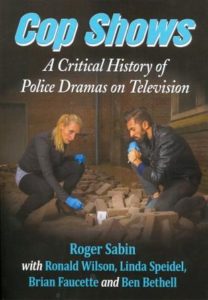I’ve been remiss in talking about some of the TV and movie reference books I’ve read over the last year…so here are a few short reviews…
 The prolific Irvin continues to mine the corners of TV ephemera for his exhaustively detailed, wonderful unique TV reference books which, as I’ve said again and again, seem to be written just for me. I love his books and wish they’d existed before I wrote my book Unsold Television Pilots back in the 80s. It would have made my research so much easier, and my listings much more informative… particularly in the case of this book. If you’ve always wanted to know more about pioneering TV producers Jack Chertok, Roland Reed, or Edward Lewis, the King of the Backdoor Pilot, this is the book for you. Speaking of back-door pilots, Irvin’s chapter on Movie Star TV Production Companies sounds like a pilot proposal for a series of books aimed, with laser-focus, on my wallet. This is a must-have for any TV reference collection….and for true historians of TV history.
The prolific Irvin continues to mine the corners of TV ephemera for his exhaustively detailed, wonderful unique TV reference books which, as I’ve said again and again, seem to be written just for me. I love his books and wish they’d existed before I wrote my book Unsold Television Pilots back in the 80s. It would have made my research so much easier, and my listings much more informative… particularly in the case of this book. If you’ve always wanted to know more about pioneering TV producers Jack Chertok, Roland Reed, or Edward Lewis, the King of the Backdoor Pilot, this is the book for you. Speaking of back-door pilots, Irvin’s chapter on Movie Star TV Production Companies sounds like a pilot proposal for a series of books aimed, with laser-focus, on my wallet. This is a must-have for any TV reference collection….and for true historians of TV history.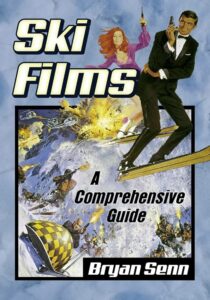 and movie-historians will find the book a fascinating and engaging reference work. I sure did. (As an aside — I can’t believe the notoriously litigious Bond producers haven’t sued McFarland & Co. for using the full poster of ON HER MAJESTY’S SECRET SERVICE as their cover!).
and movie-historians will find the book a fascinating and engaging reference work. I sure did. (As an aside — I can’t believe the notoriously litigious Bond producers haven’t sued McFarland & Co. for using the full poster of ON HER MAJESTY’S SECRET SERVICE as their cover!).tie-ins and novelizations, perhaps, than Alan Dean Foster. His anecdotes about novelizing movies and TV shows can be enjoyed on so many levels –. as a primer on the business and creative life of a working writer, as a history of tie-in,as an inside look at movie marketing, as history of film-making over several turbulent decades, and as a collection of amusing anecdotes/vignettes about Hollywood and writing. And on every level, it’s a resounding success.
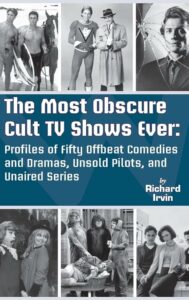 his picks of which shows and pilots and never-aired-series to include seems very arbitrary. It’s not clear what made these particular bombs any more worthy of being remembered than the 100s of others out there. The detailed descriptions of unaired episodes of short-lived become tedious and irrelevant, unless you happen to be one of the very few fans of one of these forgotten shows. I wish, instead, that less information was given on the unaired episodes and more space given to interviews with the writers & producers to give us more details on the creation and failure of these shows…and why they deserve not to be forgotten. That said, I don’t really get the point of this book. While I loved it, because I eat this kind of stuff up, I’m an outlier. I have to admit, as Irvin’s biggest fan, that this is his first misfire, a book that doesn’t strike me as necessary, or particularly useful, TV reference or history book.
his picks of which shows and pilots and never-aired-series to include seems very arbitrary. It’s not clear what made these particular bombs any more worthy of being remembered than the 100s of others out there. The detailed descriptions of unaired episodes of short-lived become tedious and irrelevant, unless you happen to be one of the very few fans of one of these forgotten shows. I wish, instead, that less information was given on the unaired episodes and more space given to interviews with the writers & producers to give us more details on the creation and failure of these shows…and why they deserve not to be forgotten. That said, I don’t really get the point of this book. While I loved it, because I eat this kind of stuff up, I’m an outlier. I have to admit, as Irvin’s biggest fan, that this is his first misfire, a book that doesn’t strike me as necessary, or particularly useful, TV reference or history book.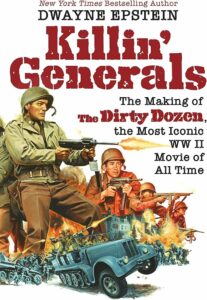 Lee Marvin: Point Blank. Epstein builds his book on his own interviews, but also upon previously published material gleaned from newspapers, actor biographies, and the like. The only drawback to the book are the lengthy, overly-detailed synopses of the novel and each draft of the script, Frankly, I skimmed most of the synopses, though I might go back to re-read those portions of the book if I ever re-watch the movie. I heartily recommend this book to anyone who is interested in film-making, regardless of whether you’ve seen the movie or not.
Lee Marvin: Point Blank. Epstein builds his book on his own interviews, but also upon previously published material gleaned from newspapers, actor biographies, and the like. The only drawback to the book are the lengthy, overly-detailed synopses of the novel and each draft of the script, Frankly, I skimmed most of the synopses, though I might go back to re-read those portions of the book if I ever re-watch the movie. I heartily recommend this book to anyone who is interested in film-making, regardless of whether you’ve seen the movie or not.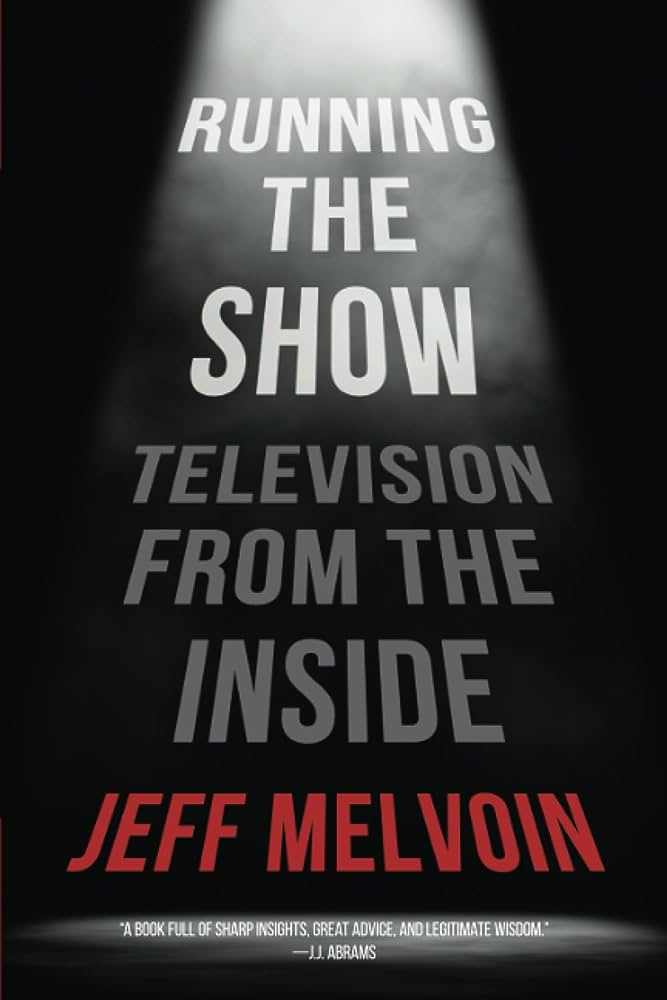

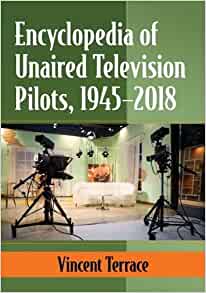 I couldn’t help myself and bought Vincent Terrace’s outrageously over-priced
I couldn’t help myself and bought Vincent Terrace’s outrageously over-priced 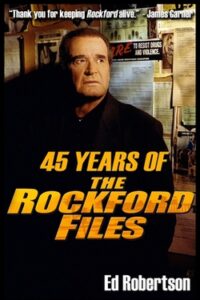 Ed Robertson just released
Ed Robertson just released 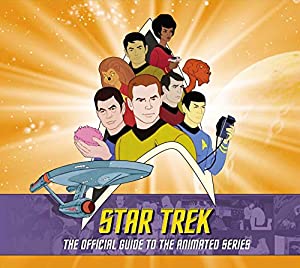 Sometimes it seems like there’s an entire segment of the publishing industry devoted only to producing books that examine every aspect of Star Trek, and it’s many sequels and spin-offs, to an almost molecular level. Some of those books are quite good (like Marc Cushman’s massive reference works). Some are just coffee-table books full of pretty pictures targeted like a tractor beam to lift every last cent from a Trekker’s wallet.
Sometimes it seems like there’s an entire segment of the publishing industry devoted only to producing books that examine every aspect of Star Trek, and it’s many sequels and spin-offs, to an almost molecular level. Some of those books are quite good (like Marc Cushman’s massive reference works). Some are just coffee-table books full of pretty pictures targeted like a tractor beam to lift every last cent from a Trekker’s wallet. 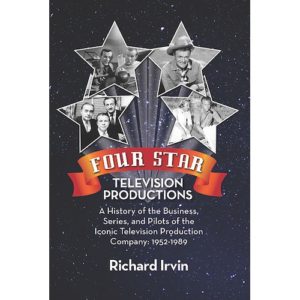
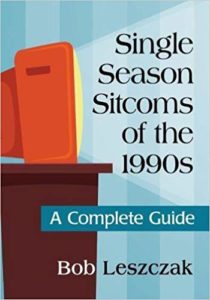
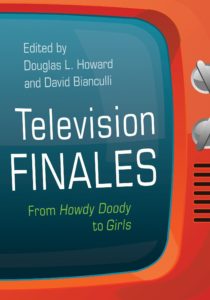 TELEVISION FINALES: From Howdy Doody to Girls, Edited by Douglas L. Howard and David Bianculli.
TELEVISION FINALES: From Howdy Doody to Girls, Edited by Douglas L. Howard and David Bianculli. 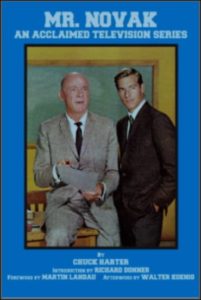
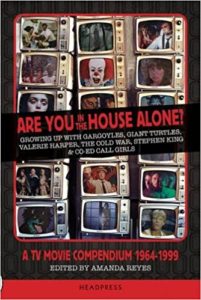



 The Bradypedia: The Complete Reference Guide to Television’s The Brady Bunch by Erika Woehlk
The Bradypedia: The Complete Reference Guide to Television’s The Brady Bunch by Erika Woehlk
 Hey, wait a minute, didn’t Hello Larry last two seasons? Yes, it did, which brings me to one of the great bonuses in this book. There’s a lengthy appendix entitled “Shows Invited Back for a Truncated or Vastly Different Second Season” that covers scores of comedies that returned for a second season (and in some cases many more seasons) in a very different form, either completely reformatted and/or recast. It’s like getting two books for the price of one. A good example of one such revamped series is Goodnight Miss Bliss, a comedy starring Hayley Mills as a school teacher, that was canceled after one season. The show returned with the students and minus the teacher as the Saturday morning comedy Saved by the Bell and became a big success.
Hey, wait a minute, didn’t Hello Larry last two seasons? Yes, it did, which brings me to one of the great bonuses in this book. There’s a lengthy appendix entitled “Shows Invited Back for a Truncated or Vastly Different Second Season” that covers scores of comedies that returned for a second season (and in some cases many more seasons) in a very different form, either completely reformatted and/or recast. It’s like getting two books for the price of one. A good example of one such revamped series is Goodnight Miss Bliss, a comedy starring Hayley Mills as a school teacher, that was canceled after one season. The show returned with the students and minus the teacher as the Saturday morning comedy Saved by the Bell and became a big success.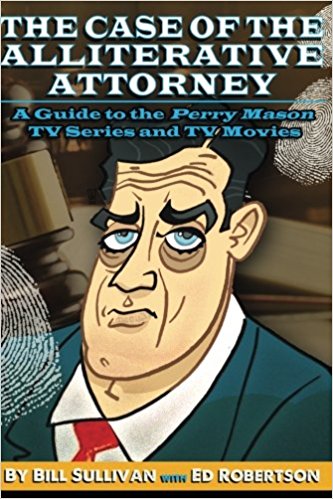
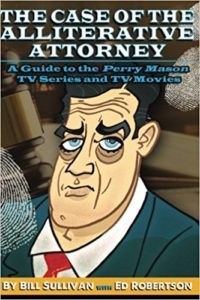 The Case of the Alliterative Attorney: A Guide to the Perry Mason TV Series and TV Movies by Bill Sullivan and Ed Robertson
The Case of the Alliterative Attorney: A Guide to the Perry Mason TV Series and TV Movies by Bill Sullivan and Ed Robertson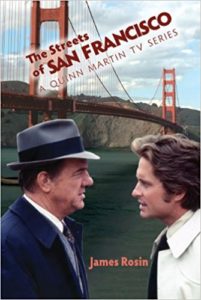 For example, he lists Michael Douglas as a cast member in an episode long after he left the series). It’s filled with interesting production information gleaned from interviews with the cast and crew, some freshly done by the author himself while other quotes are lifted from previously published books and articles. It’s an enjoyable, informative read for fans of the show as well as students of television that benefits enormously from the insights provided by writer-producer John Wilder. I especially liked the details on script development.
For example, he lists Michael Douglas as a cast member in an episode long after he left the series). It’s filled with interesting production information gleaned from interviews with the cast and crew, some freshly done by the author himself while other quotes are lifted from previously published books and articles. It’s an enjoyable, informative read for fans of the show as well as students of television that benefits enormously from the insights provided by writer-producer John Wilder. I especially liked the details on script development.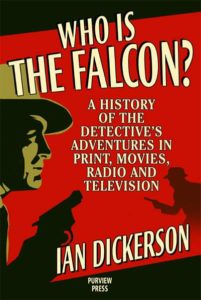 Who is The Falcon by Ian Dickerson.
Who is The Falcon by Ian Dickerson.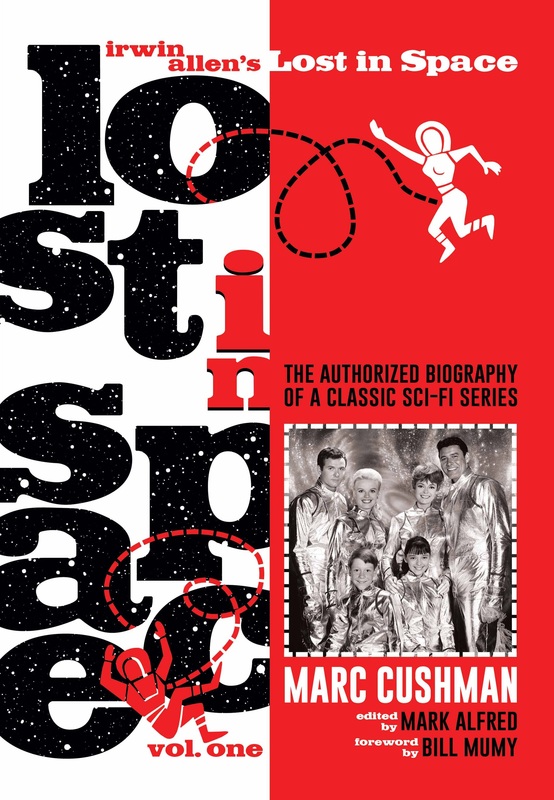
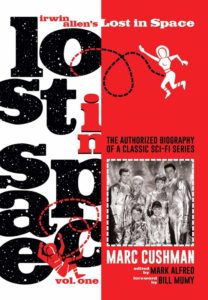 I’m a sucker for TV books, even those about shows I didn’t watch or don’t particularly like…because, often, I can learn something new about the development, writing and production of TV series that I didn’t know before despite my own experience in the biz. Here are some short reviews of three recent releases.
I’m a sucker for TV books, even those about shows I didn’t watch or don’t particularly like…because, often, I can learn something new about the development, writing and production of TV series that I didn’t know before despite my own experience in the biz. Here are some short reviews of three recent releases.